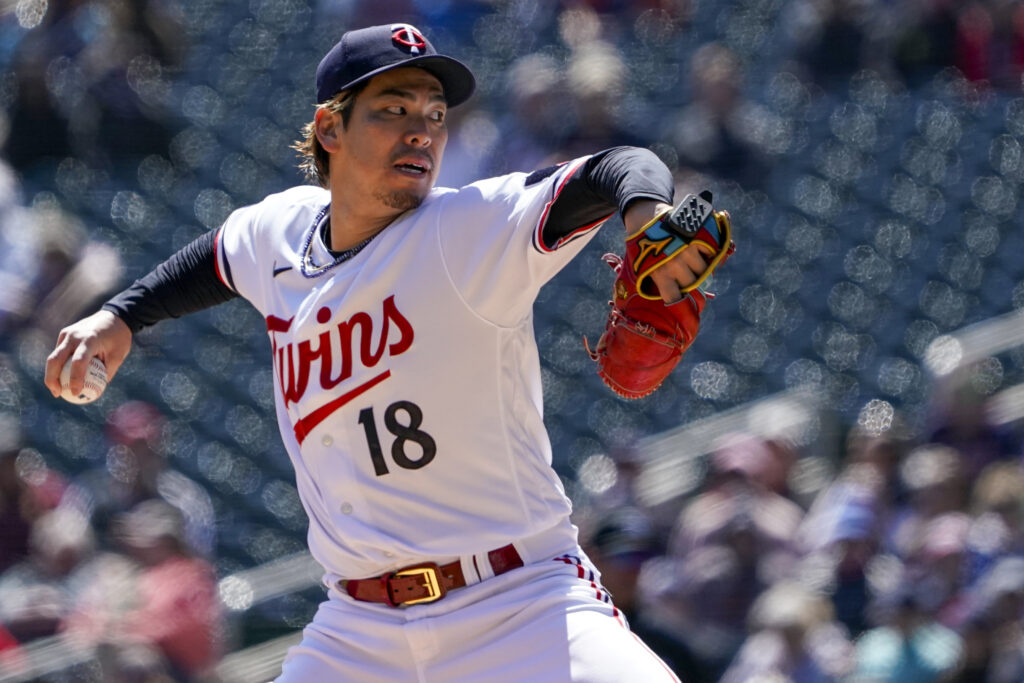The Tigers and right-hander Kenta Maeda have agreed to a two-year contract, according to Jon Heyman of the New York Post (X link). ESPN’s Jeff Passan reports that Maeda will earn $24MM in guaranteed money, and Evan Petzold of the Detroit Free Press writes that the deal will become official Monday once Maeda passes a physical. Maeda is represented by the Boras Corporation.
Reports emerged earlier this week linking Maeda and the Tigers, though the Twins (Maeda’s former team) maintained interest. Minnesota will now have to deal with Maeda as an opponent on a division rival, as Maeda will join the third team of his Major League career as he enters his age-36 season.
With Eduardo Rodriguez possibly leaving Detroit in free agency, Maeda steps in as the veteran presence within a Tigers rotation that is still pretty young and inexperienced overall. Most of the Tigers’ young arms were also set back by injuries during the club’s nightmarish 2022 season, though Tarik Skubal and Matt Manning pitched well when healthy, and Reese Olson stepped up as a legitimate rotation candidate. At the moment, Maeda looks to be the No. 2 on the staff behind Skubal, with Manning, Olson, and Casey Mize (set to return after missing 2023 due to Tommy John surgery).
 This offseason marked the end of the incentive-heavy, eight-year, $25MM deal Maeda signed with the Dodgers back in January 2016, when Maeda first came to the majors from Nippon Professional Baseball. Maeda’s earning power at the time was somewhat limited due to some concerns over his elbow, though he didn’t have any major arm-related injury issues over four years in Los Angeles before the Dodgers dealt him to the Twins during the 2019-20 offseason. Maeda responded with an outstanding performance in the pandemic-shortened campaign, posting a 2.70 ERA in 66 2/3 innings and finishing second in AL Cy Young Award voting.
This offseason marked the end of the incentive-heavy, eight-year, $25MM deal Maeda signed with the Dodgers back in January 2016, when Maeda first came to the majors from Nippon Professional Baseball. Maeda’s earning power at the time was somewhat limited due to some concerns over his elbow, though he didn’t have any major arm-related injury issues over four years in Los Angeles before the Dodgers dealt him to the Twins during the 2019-20 offseason. Maeda responded with an outstanding performance in the pandemic-shortened campaign, posting a 2.70 ERA in 66 2/3 innings and finishing second in AL Cy Young Award voting.
With a more modest 4.66 ERA in 106 1/3 frames in 2021, the injury bug then finally bit, as Maeda had to undergo the internal-brace version of Tommy John surgery. Using the brace theoretically could have reduced Maeda’s time on the injured list, yet he ended up missing the entire 2022 season. His comeback year in 2023 was also shortened by close to two months by a triceps strain, but the numbers were pretty solid overall when Maeda did take the mound.
Maeda posted a 4.23 ERA, 27.3% strikeout rate, and 6.5% walk rate over 104 1/3 innings for Minnesota. Both the walk and strikeout rates were well above average, and Maeda wasn’t a high-velocity pitcher even before surgery, so his 90.9mph average was just slightly below his career norm. Maeda did allow a lot of hard contact last year, which was something of a red flag considering that he very good and occasionally elite at inducing soft contact in the seasons prior to his brace procedure.
Between the hard-contact numbers, Maeda’s age, and injury history, the expectation was that Maeda’s market might be limited to a two-year (or two years with an option) contract this winter. MLBTR ranked Maeda 25th on our list of the offseason’s top 50 free agents, and predicted a two-year, $36MM pact for the right-hander. The actual dollar figure will fall below our projection, perhaps suggesting that teams had concerns over Maeda’s ability to stay healthy. Speculatively, it could also be that Maeda preferred to get a deal done sooner rather than later, perhaps as a nod to the strong interest shown by the Tigers this early in the winter.
There’s no doubt that the righty has a high ceiling of performance when he’s healthy, making the signing a pretty solid move for Tigers president of baseball operations Scott Harris. After spending most of his first year in the job in evaluation mode, Harris has started to make some modest but noteworthy expenditures for veteran talent, both in signing Maeda and in trading for Mark Canha earlier this month. Adding Maeda’s deal puts Detroit’s projected payroll (as per Roster Resource) at only $85.26MM, though Harris has spoken of exercising financial caution in the past, and it isn’t yet clear how much the Tigers are willing to spend this winter.
At the very least, the Tigers have the flexibility to perhaps explore a bigger move should an opportunity present itself, and Maeda’s signing perhaps opens such a door in a unique fashion. Petzold wrote this week that the Tigers were looking at Maeda both for the pitcher’s own value and also to “establish themselves in the Japanese pitching market.” This is particularly intriguing in the context of Detroit’s interest in Yoshinobu Yamamoto, and if Harris and Tigers ownership were prepared to break the bank on a player, it might be for this circumstance of a 25-year-old Japanese ace who might have up to a decade of prime baseball still ahead of him.
Shota Imanaga is another prominent name coming to the majors from NPB this winter, even if Imanaga is 30 and his ceiling isn’t considered as high as Yamamoto’s. It is also possible the Tigers might not be done with veteran pitchers from the Major League free agent market, as names like Seth Lugo and Luis Severino are also reportedly on Detroit’s radar as arms available on shorter-term and relatively less-expensive contracts.
An argument could’ve been made for the Twins to issue Maeda a qualifying offer as he entered free agency, yet with Minnesota planning to cut payroll next year, it is easy to see why the Twins might not have wanted to risk Maeda accepting the offer and locking in a $20.325MM salary for 2024. As a result, Minnesota won’t receive anything in compensation for Maeda’s departure. SKOR North’s Darren Wolfson writes that the Twins only had interest in Maeda on a one-year contract.
Photo courtesy of USA Today Sports Images
Source link
credite

